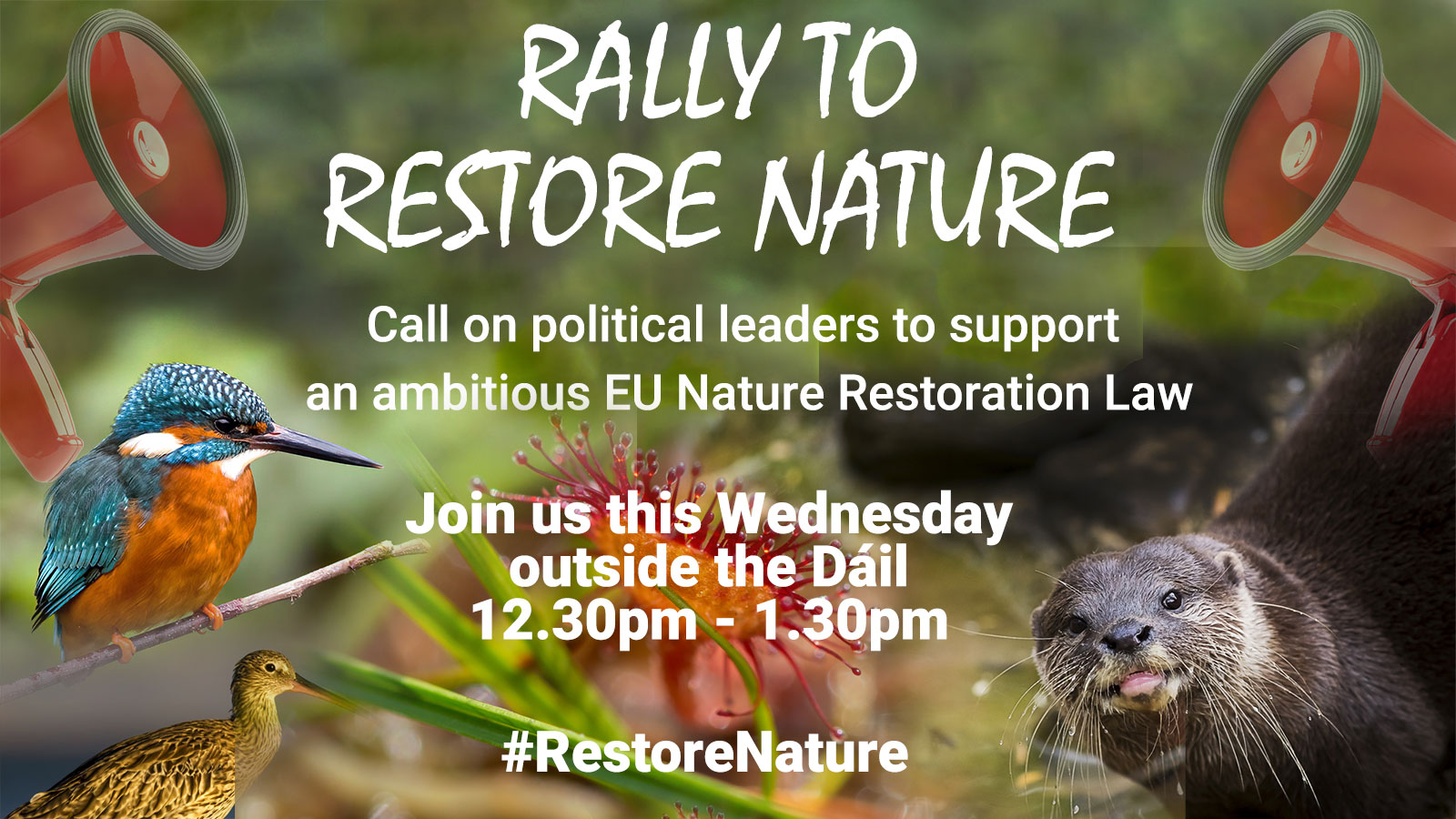People take a stand for nature as politicians waver
A coalition of leading environmental organisations are rallying together from across Ireland in a call for political leaders to support an ambitious Nature Restoration Law. At the Rally to Restore Nature, scientists, activists, community leaders and other members of society will demand that restoration of nature be placed at the forefront of public policy deliberations in Ireland and that all political parties support the Nature Restoration Law in EU negotiations.
The event will take place on 31 May outside the gates of Leinster House, starting at 12.30 p.m.
The Rally to Restore Nature is being organised by the Environmental Pillar, Stop Climate Chaos, the Sustainable Water Network (SWAN), and Extinction Rebellion – a consortium of national coalitions working to address Ireland’s interlinked climate and biodiversity crises. With a shared determination to restore nature and tackle climate change, environmental groups are prepared to raise their voices, demanding that political leaders take immediate steps to adopt an ambitious approach to the negotiation of an EU Nature Restoration Law.
The demonstration comes at a time when Ireland is facing an unprecedented biodiversity crisis. With nature under threat and more than 80% of habitats in poor condition across Europe1, urgent action is required to halt biodiversity loss. The Nature Restoration Law, currently being negotiated at an EU level, is the most important piece of biodiversity legislation to come out of Europe in thirty years. Despite the clear need for a redoubling of efforts across Europe to restore nature, Fine Gael, Fianna Fáil and Sinn Féin MEPs have spoken out against the draft law, caving in to misinformation and hysteria which has been spread to derail the law. As a consequence several Irish MEPs have voted in the European Parliament to completely scrap the Nature Restoration Law instead of engaging with stakeholders and tabling amendments that would improve the regulation.
“There is strong support across Irish society for ambitious action to restore nature. The Citizens Assembly on Biodiversity Loss recently recommended that Ireland play a leading role in the adoption of the EU Nature Restoration Law,” said Fintan Kelly, Agriculture and Land Use Policy and Advocacy Officer representing the Environmental Pillar.
He continued, “There has been a lot of misinformation about the law and it’s time that party leaders reassured farmers that nature restoration is in their interests and that they will be involved in the design and implementation of any future voluntary schemes. Many of the targets within the draft law are less ambitious than existing national targets. The Nature Restoration Law should be viewed as an opportunity to leverage new EU and national funds to deliver the greatest benefit for nature and rural communities.”
Sadhbh O’ Neill, Climate Campaign Coordinator with the Stop Climate Chaos Coalition, said “An ambitious nature restoration law is essential to tackle the twin biodiversity and climate crises. Taking action to reduce carbon losses from drained peatlands and organic soils is also in line with the government policy as set out in the Climate Action Plan. Over 10m tonnes of CO2 is released annually from these two sources, which should be a cause for alarm2. Yet Fine Gael, Fianna Fáil, and Sinn Féin MEPs are blocking the Nature Restoration Law before negotiations have even begun.
We need our elected leaders to wake up and recognize that climate action is widely supported by their voters and urgently needed. The Nature Restoration Law is an opportunity to create a lasting framework and funding stream to restore ecosystems, including peatlands which are vital carbon sinks.”
Sinéad O’Brien, SWAN Coordinator said “90% of our wetlands in Ireland have been lost 3. Restoring our wetland habitats through this law, will not only benefit biodiversity, it will benefit water quality and climate. Half our rivers are unhealthy4. This law would make a significant contribution to restoring them by removing barriers, which creates healthy free flowing rivers again for migratory fish, like our salmon. Ireland has also failed to fully meet six out of eleven indicators for the health of our seas5, while marine species such as angel sharks and porbeagles have undergone a 90% decline6. This law would help restore carbon-storing and biodiversity-rich habitats to our seas.
We need this law to restore nature to our wetlands, rivers and seas; we need it to be as strong as possible; and we need our politicians to make it happen.”
The Rally to Restore Nature will mobilise communities to demonstrate in front of Leinster House, ahead of statements in the Dáil planned for 2.00 p.m. on the current state of play regarding the Nature Restoration Law and Irish Agriculture. Rally organisers are calling for all of Ireland’s political parties to support an ambitious Nature Restoration Law, to develop a national funding package to restore nature across public and private lands, and to secure an EU commitment to a new dedicated EU Nature Restoration Fund.
We invite all concerned community members and organisations to join in this vital effort to raise awareness about the urgent need to restore nature and demand leadership from Ireland’s elected officials.
Rally to Restore Nature
Date: Wednesday 31st of May, 2023
Time: 12.30 p.m.
Venue: Outside the gates of Leinster House, Kildare Street, Dublin 2
Notes:
[1] European Commission, Nature Restoration Law: https://environment.ec.europa.eu/topics/nature-and-biodiversity/nature-restoration-law_en
[2] EPA (2022) National Inventory of Greenhouse Gas Emissions for 2021 available at https://www.epa.ie/publications/monitoring–assessment/climate-change/air-emissions/irelands-provisional-greenhouse-gas-emissions-1990-2021.php
[3] Fluet-Chouinard, E., Stocker, B.D., Zhang, Z. et al. Extensive global wetland loss over the past three centuries. https://www.nature.com/articles/s41586-022-05572-6.epdf?sharing_token=U7AaMPQk41o0393kzz_sUNRgN0jAjWel9jnR3ZoTv0PbHROEZ7UgcrLuGBROGGb5myeKrDMguIKVy0wCrjzHBxfEZYpCWx4muajTIuHlInrwffm5Y023LgLLhvePPHgTCOO2B9Qt_6C6Gq-91rlsFFAjl4qkSzz2YwOV4FheYH0FW63SVw9p6WR9QByOu5gbjsvv2HWIttinH89ABuHa86KyZIW6-S_26Pfx_qZN0HiTAZ7uQG35hcAe2rbiUFC9CeH4T0-_uEltihA91p6Wd8U3c7t2-1qNQ7XLLMN27_aoi8mkPs2FLdWQ3ua8ApQSUCdZyLzVDrhBr-akw3rExQ%3D%3D&tracking_referrer=www.theguardian.com

